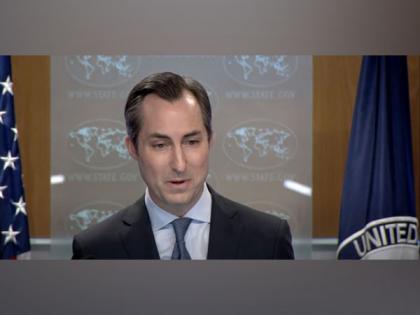I don't want to speak on private diplomatic exchanges...: US State Department on Pak cable
By ANI | Updated: August 10, 2023 04:00 IST2023-08-10T03:56:28+5:302023-08-10T04:00:04+5:30
Washington DC [US], August 10 : US State Department spokesperson Matthew Miller on Wednesday (local time) said he does ...

I don't want to speak on private diplomatic exchanges...: US State Department on Pak cable
Washington DC [US], August 10 : US State Department spokesperson Matthew Miller on Wednesday (local time) said he does not want to speak on private diplomatic exchanges revealed in the cypher document. He added that the comments in the document in no way showcase the US taking a position on who the leader of Pakistan ought to be.
Addressing a press briefing on Wednesday (local time), Miller said the US expressed concern privately to the Pakistan government as it expressed concern publicly regarding the then-Pakistan Prime Minister's visit to Russia on the same day when the conflict between Moscow and Kyiv started.
Asked about the veracity of comments in the cypher document, Miller said, "Yes, it is reported to be a Pakistani document. I can't speak to whether it is actually a Pakistani document or not, just simply don't know. With respect to the comments that were reported, I don't want to speak on private diplomatic exchanges, other than to say that even if those comments were accurate as reported, they in no way show United States taking a position on who the leader of Pakistan ought to be."
"We expressed concern privately to the government of Pakistan as we expressed concern publicly about then-Prime Minister Khan to Moscow on the very day of Russia's invasion of Ukraine. We made that concern quite clear. But, as the former ambassador of the Pakistan to the US himself stated the allegations that the United States has interfered in the internal decisions about the leadership of Pakistan are false as we have stated they are false. They have always been false and they remain false," he added.
Miller was asked about the document after The Intercept reported that the US State Department, in a meeting on March 7, 2022, encouraged the Pakistani government to remove Imran Khan as the country's Prime Minister over his neutrality in the conflict between Russia and Ukraine.
Miller said the comments in the purported cable show the US government expressing concern regarding the policy choices that Imran Khan was taking as Pakistan's PM. He said the comments in no way showcase the US government expressing a preference on who the leadership of Pakistan ought to be.
"If you take all of the comments that were reported in that purported cable, I think what they show is that US government expressing concern about the policy choices that the Prime Minister was taking. It is not in any way the United States government expressing a preference on who the leadership of Pakistan ought to be," Miller said at the press briefing.
He added, "I cannot speak to the veracity of this document. What I can see, let us even, if those comments are 100 per cent accurate as reported, which I do not know them to be. They do not in any way show a representative of the State Department taking a position on who their leadership, they are commenting on."
The meeting between the Pakistani ambassador to the US and two US State Department officials has been a matter of intense scrutiny, controversy, and speculation in Pakistan over the past year and a half, as the former Pakistan PM and his military and civilian opponents struggled for power.
One month after the meeting with US officials was revealed in the Pakistan government's document, a no-confidence vote was held in Parliament, resulting in Khan’s ouster from power. The vote in the Pakistani parliament was believed to have the support of Pakistan's army.
The text of the Pakistani cable, known as "cypher", produced from the meeting by the ambassador and transmitted to Pakistan has revealed the methods used by the US State Department in its push against Khan, promising warmer ties with Islamabad if Khan was removed, and isolation if he was not, The Intercept reported.
The document, titled 'Secret', includes an account of the meeting between US State Department officials, including Assistant Secretary of State for the Bureau of South and Central Asian Affairs Donald Lu and Asad Majeed Khan, who was then Pakistan's ambassador to the US, The Intercept reported.
The cable includes the carrots and sticks used by the US State Department in its push against then-Pakistan PM Imran Khan. The dynamics of the Pakistan-US ties mentioned in the cable were subsequently borne out by events, according to The Intercept report. In the cable, the US has raised objections to the foreign policy of Imran Khan over the Russia-Ukraine conflict. The stance taken by Imran Khan over Ukraine was quickly reversed post his removal from office.
Disclaimer: This post has been auto-published from an agency feed without any modifications to the text and has not been reviewed by an editor
Open in app